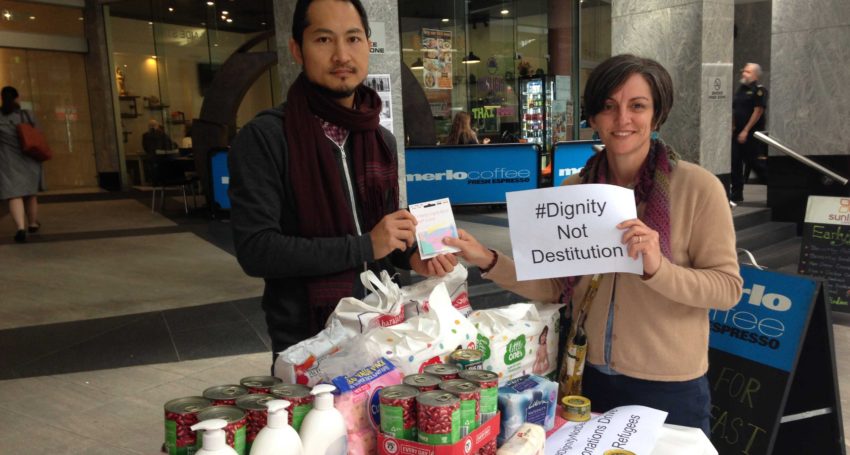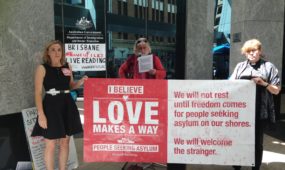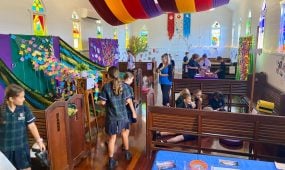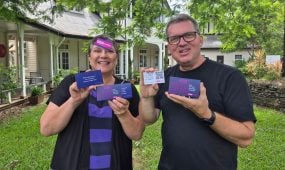From preaching to the choir to shifting fence sitters
Features
“My experience advocating for people seeking asylum taught me that you can have a lot of passion and good intention for a group of vulnerable people or an important cause, but that the right words and approach are needed for people to see your point of view or join the movement for justice,” says the Justice Unit’s Peter Branjerdporn, while inviting clergy, lay leaders and advocates in our community to a free online justice messaging workshop, co-hosted by Resource Church St John’s Cathedral, the Justice Unit and anglican focus

In 2012, I spent a year on the Thailand-Burma border volunteering as a pharmacist-trainer in a refugee health and community centre. There, I became friends with people seeking safety from one of the world’s longest civil wars, and started advocating for stateless Rohingya families in the region via social media.
When I returned home and became increasingly involved in advocating for the rights of people seeking asylum, I joined Love Makes A Way, a movement of Christians seeking compassion for people seeking asylum through prayer and nonviolent actions. At our refugee vigils I met many amazing people, including former ACSQ Justice Unit Coordinator Jen Basham; The Very Rev’d Dr Peter Catt who was Chair of The Australian Churches Refugee Taskforce at the time; and Michelle McDonald, who also joined Love Makes A Way. We worked and campaigned tirelessly, but found it very difficult to change people’s negative perceptions of the rights of people seeking safety. It quickly became clear to me that many Australians’ attitude towards refugees had worsened while I was away!
Advertisement
Years of negative messages and effective fear campaigns about people seeking asylum, by our elected leaders and parts of the media, made it difficult for people, including Christians, to feel compassion towards these fellow humans who are made in God’s image. This reality prompted one of Australia’s major refugee advocacy organisations to commission research on what messages resonate with Australians, so that we could communicate more effectively – both in advocacy campaigns and also in conversations with friends and family. That organisation subsequently ran workshops for refugee advocates, like me, from different walks of life. At one of these workshops, I learned how reframing our communications and conversations can help us to be more effective in shifting people who are ambivalent or on the fence about refugee needs and rights.
The research and Australia-wide workshops had a huge impact on the effectiveness of how refugee advocacy and service provider organisations around Australia communicated about the rights and needs of refugees and people seeking asylum. This contributed to a shift in how Australians viewed refugees and people seeking asylum, which consequently resulted in a positive outcome for campaigns like #KidsOffNauru, where 170,000 Australians signed a petition to get children evacuated from Nauru to Australia.
Advertisement
My experience advocating for people seeking asylum taught me that you can have a lot of passion and good intention for a group of vulnerable people or for an important cause, but that the right words and approach are needed for people to see your point of view or join the movement for justice.
A friend recently mentioned how a prominent justice advocate made her feel inadequate and guilty about her and her family’s lifestyle. I could feel a sense of disempowerment in her voice when she then said that she could never be as useful or dedicated as that advocate. We need to speak up for justice, whether it be for people living with disability, refugees or creation care. However, when we communicate in a way that does not resonate with our audience, we can end up wasting time and energy ’preaching to the choir’ and often alienating everyone else, including those we could potentially shift for the common good.
In my role with the Justice Unit, I work closely with the Social Responsibilities Committee whose top priority shifted two years ago from refugee advocacy to climate and creation care. A safe climate is one of the most effective ways to prevent people from being displaced from their homelands due to extreme weather events and the resulting poverty and geo-political conflicts.
The Cathedral and the Justice Unit hosted climate conversations for local Anglicans and other Christian Queenslanders over the past two years. At these events, we learned a lot about words and phrases that are unhelpful and helpful when speaking about climate and creation care. Along with ACSQ Resource Church specialist Michelle McDonald, we have produced a suggested key-principles-and-tips resource outlining alternative ways to frame climate and creation care conversations and communications for our Diocesan community. The Very Rev’d Dr Peter Catt, Michelle and I invite you to an upcoming workshop on Friday 18 June to explore these alternative principles.
Related Story
 Features
Features
From accidental double agent to more effective advocate
The Jesus whom we follow is himself the Word, who became flesh and lived among us. He learned and understood what it was like to live in the world with all of the pressures and worries of life. He learned the vernacular and effectively shared his message of radical compassion and care for humanity and all of Creation. May we also learn to better reframe our words in the climate and creation care space for the common good.
The free online ‘Reframing climate and creation care communications for Christians’ workshop will be held on Friday 18 June between 9.00 am and 12 noon. Register online by 5 pm Tuesday 15 June. The workshop is co-hosted by Resource Church St John’s Cathedral, the Justice Unit and anglican focus. While the workshop will focus on climate and creation messaging, the principles explored have application across broad advocacy areas. To find out more, please email contact@doingjustice.org.au or focus@anglicanchurchsq.org.au.





